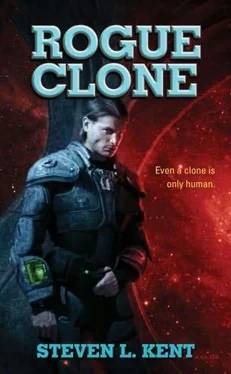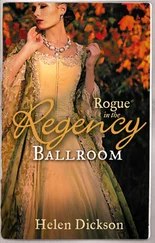Steven Kent - Rogue Clone
Здесь есть возможность читать онлайн «Steven Kent - Rogue Clone» весь текст электронной книги совершенно бесплатно (целиком полную версию без сокращений). В некоторых случаях можно слушать аудио, скачать через торрент в формате fb2 и присутствует краткое содержание. Жанр: Боевая фантастика, на английском языке. Описание произведения, (предисловие) а так же отзывы посетителей доступны на портале библиотеки ЛибКат.
- Название:Rogue Clone
- Автор:
- Жанр:
- Год:неизвестен
- ISBN:нет данных
- Рейтинг книги:3 / 5. Голосов: 1
-
Избранное:Добавить в избранное
- Отзывы:
-
Ваша оценка:
- 60
- 1
- 2
- 3
- 4
- 5
Rogue Clone: краткое содержание, описание и аннотация
Предлагаем к чтению аннотацию, описание, краткое содержание или предисловие (зависит от того, что написал сам автор книги «Rogue Clone»). Если вы не нашли необходимую информацию о книге — напишите в комментариях, мы постараемся отыскать её.
Rogue Clone — читать онлайн бесплатно полную книгу (весь текст) целиком
Ниже представлен текст книги, разбитый по страницам. Система сохранения места последней прочитанной страницы, позволяет с удобством читать онлайн бесплатно книгу «Rogue Clone», без необходимости каждый раз заново искать на чём Вы остановились. Поставьте закладку, и сможете в любой момент перейти на страницу, на которой закончили чтение.
Интервал:
Закладка:
The last time I had passed through one of these stations was just two days earlier, and I had been spotted as Wayson Harris the Liberator. This time I had no idea how the computer would label me. I might be an AWOL Marine or a Liberator or a dead Marine. As I approached the posts, I heard the quick blast of air as it wafted across the man ahead of me. I looked at the armed guards inside the station and wondered if testing my identity so soon was a mistake.
The guard on the other side of the posts, a civilian in an outfit designed to look like an old fashion police uniform, motioned me forward. As I stepped forward, I considered everything that would happen in the next three seconds. One of the jams would hit me with a burst of air. The other jam would inhale the air and any debris it shook loose. A bank of computers would scan my DNA. If the computer warned the guards that I was a Liberator in the Orion Arm …as I thought about it, being recognized here would be more dangerous than being recognized in the Golan Dry Docks. Here, in the Orion Arm, where Liberators were illegal, being spotted might be fatal. I was betting my life that Admiral Che Huang was a man of his word. What was wrong with me?
The guard, a grubby man whose shirt barely fit over his jostling beer belly, hardly noticed me as I stepped between the posts. He had a pistol. There was no bulletproof glass around this security station, but I noticed a dozen armed guards around the area.
A warm and humid breeze blew through the open-air lobby of the terminal. Most people stepped right through the posts, but I stood my ground waiting to see what would happen.
The security guard looked at me curiously. “You okay?” he asked.
I looked around the station, other people were watching me curiously as well. No one reached for their guns. “Yes,” I said. “I’m more than okay. I’m street-legal.”
The man gave me a suspicious look, but what could he do? His high-tech security equipment had searched both me and my identity.
I walked across the terminal and followed signs to the private pilots/corporate jets terminal. Nobody stopped me when I asked for my plane, and I left Hawaii without incident. I was for all intents and purposes, a free man.
This time I would use the Broadcast Network. I saw no point in advertising that I still had my hands on a self-broadcasting transport. If Huang knew I had a self-broadcasting ship from the Doctrinaire , he would demand its return and possibly keep the ship for himself. After all, the good will that now existed between us only went so far.
I put in a call to Colonel McAvoy, the head of security at the Golan Dry Docks as I started the long trip to Mars. I asked him if he had searched Klyber’s C-64 for listening devices. He said, “No,” but said that he would and that he would get back to me shortly. The Unified Authority’s only fleet admiral had died on his watch. McAvoy’s career would be as good as over unless he caught the murderer. Ten minutes after we hung up, Colonel McAvoy called back to say that he had located a wide array of spying devices.
“That clears Adam Boyd,” I said.
“Spying devices clear the guy?” McAvoy asked.
“I talked with Huang,” I said. “Boyd was Huang’s man, and Huang admits having Boyd plant the devices. Why bother planting mikes and cameras on the ship if you plan to kill the passengers?”
“Spying as an alibi for murder,” the colonel observed. “That’s a new one.”
“I need whatever information you can get me on the rest of the maintenance team,” I said. “And get me anything you can on Admiral Halverson. I need to know where he went when he left the Dry Docks, and I need to know if he went alone.”
One of the niceties of crossing such highly trafficked airspace as the lanes between Earth and Mars was that you did not need to pilot your own ship. With thousands of ships traveling at millions of miles per hour in a relatively small pocket, collisions would be inevitable without computers seizing control of every spacecraft. Pilots who refused to relinquish control were given mere moments to turn around before squadrons were scrambled from Mars Station to shoot them down.
Now that I was a legitimate citizen, I chose the conservative route. I logged my travel plans into the Mars traffic control computer and allowed it to schedule my route through the Broadcast Network. From here on out, I would not need to touch a flight stick or turn a knob until the Network spilled me out a few minutes from the Dry Docks.
I leaned back in my chair and stared out the window at the endless blackness of outer space. Stars winked in the distance. Out here I could see the colors of the planets. Jupiter, a dust-colored marble with horizontal stripes, loomed off to the right. Mars, not really red but tan with a rust-colored patina, floated in the darkness dead ahead.
I looked back at the dimly lit cabin behind me. The passenger seating was no more comfortable than my pilot’s chair, but I liked the idea of leaving the cockpit. Taking my mediaLink shades, I slipped into the first chair behind the cockpit and reclined it as far back as it would go.
The top story of the day was Bryce Klyber’s funeral. Several sites, both civilian and military, showed the service in its entirety. The faces of the guests taking up the front two rows of Arlington Chapel were remarkably similar to to those sitting around the table at the summit. Smith and the other Joint Chiefs were there along with their aides. In enlisted man lingo, “There were so many stars and bars in that funeral you would have sworn you were touring a flag factory.”
Huang was there. I expected him to have a secret grin or at least the smug sneer with which he customarily greeted the world, but he did not. Huang stared straight ahead at the glossy black casket that lay on the stand. He did not look arrogant or satisfied. If anything, he looked worried.
“Hello, Judas,” I said when I saw Captain Leonid Johansson was there as well. Captain was a much higher rank in the Navy than it was in the Marines. But even as a Navy captain, Johansson looked like a piker in this setting. The chapel was filled with admirals, generals, and famous politicians. The Joint Chiefs and members of the Linear Committee sat on the front pew. I looked for people who might be Klyber’s family and saw no one. After the service, as I filtered through ancillary stories, I learned that Klyber had never married. He’d outlived his siblings. Except for the Navy, he was alone.
In the grand tradition of Washington D.C. funerals, this service droned on and on. I wondered if I would reach Mars before it ended. First there was some dreary organ music. Then a Protestant minister stood up to speak. The man gave a thirty-minute sermon over the dead body of a devout atheist. I imagined Klyber’s ghost rising from the coffin to say, “Listen to this rubbish, not over my dead body.”
After the sermon came the eulogies. I thought military men kept their speeches short, but General Alexander Smith of the U.A.A.F. went on for forty-five frigging minutes. Next came two of Klyber’s pals in politics. I expected them to drone on and they did not disappoint.
A small red emergency beacon flickered on and off at the bottom of my vision. By flicking my eyes at the flashing symbol, I brought up the call.
“Harris, are you seeing this?” Freeman asked.
“Seeing what?” I asked, though I really wanted to say, “Ray, nice to hear from you. Yes, the flight has been good so far. And how are you?”
“Gateway Outpost is under attack,” said Freeman.
I knew Gateway. It was a habitable planet in the area where the Orion and Sagittarius arms met. The space around Gateway was a high-security zone even though Sagittarius and Orion were the only arms that remained fully loyal to Earth.
Читать дальшеИнтервал:
Закладка:
Похожие книги на «Rogue Clone»
Представляем Вашему вниманию похожие книги на «Rogue Clone» списком для выбора. Мы отобрали схожую по названию и смыслу литературу в надежде предоставить читателям больше вариантов отыскать новые, интересные, ещё непрочитанные произведения.
Обсуждение, отзывы о книге «Rogue Clone» и просто собственные мнения читателей. Оставьте ваши комментарии, напишите, что Вы думаете о произведении, его смысле или главных героях. Укажите что конкретно понравилось, а что нет, и почему Вы так считаете.












